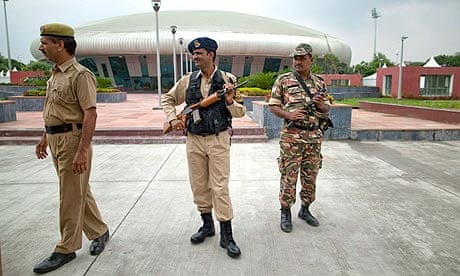Commonwealth Games organisers in Delhi have been given 48 hours to save the crisis-hit event after team officials warned they would pull their athletes out if serious ongoing concerns about the standard of facilities were not immediately addressed.
The sense of impending crisis was exacerbated when a section of the ceiling in the weightlifting arena fell down amid growing fears over rising flood waters near the athletes' village, which had already been condemned by team officials as "filthy" and "unfit for human occupation".
With the Games at risk of descending into farce, thousands of athletes from the major competing nations remained in the dark about whether or not they would be boarding a plane to compete.
The Scottish team delayed the departure of the first batch of their 192 athletes, comprising 41 boxers, rugby players, wrestlers and support staff. The Wales team set a deadline of Wednesday night to receive reassurances from organisers that the athletes' village and venues would be "fit for purpose" and plan to discuss the issue further on Thursday.
The first batch of 22 English athletes, including the lawn bowls team and the men's hockey squad, are due to fly out as planned, but the English chef de mission, Craig Hunter, said organisers were not making nearly enough progress on the ground.
A mass walkout remains an option, with the "point of no return" seen as early next week. The main competing countries would be likely to act in concert and are in constant communication with one another.
Michael Cavanagh, chairman of Commonwealth Games Scotland, said any decision would be a joint one and insisted that any knock on effects for the Glasgow Games in 2014 would not be a factor.
"In terms of withdrawal we don't see this as simply a Team Scotland decision," he said. "Any decision to withdraw we would see as being a collective decision amongst the countries who are already there and already concerned."
He added: "We can't allow ourselves to be influenced by thoughts of how it may impact on 2014, not when we have something as important as the safety of our athletes to consider."
Although England had been allocated one of the more habitable of the 34 blocks in the athletes' village, Hunter told the Guardian there had "not been much progress" in ensuring that it was fit for habitation in the week he had been there.
"I'm trying to remain eternally optimistic. But at some point we will reach the point of no return and that is when we will have to decide."
While organisers continued to insist there were only "minor issues", Hunter said that was patently not the case.
Commonwealth Games Federation president, Mike Fennell, will arrive in Delhi tomorrow and is likely to meet with the Indian prime minister for crisis talks aimed at saving the Games. Mike Hooper, CWF chief executive, said he would be seeking to draw a line under the blame game that has already begun and put pressure on the government to avoid more international embarrassment.
"There is a problem, it needs fixing. I'm not into pointing fingers. They have the next couple of days to put things right," said Hooper. He said that while venues were built to a high standard, and he had no concerns over security, the sorry state of the village was a huge worry.
The beleaguered Delhi chief minister, Sheila Dikshit, played down the problems and accused the media of damaging India's image. "Something may be dripping, some tile may collapse, doesn't mean the entire Games are bad," she told reporters.
It is now known that the accident on Tuesday, in which 27 were injured when a bridge connecting the athletes' carpark to the main Jawaharlal Nehru Stadium collapsed, was caused when a metal pin worked loose detaching the main structure from its suspension cables.
Five workers remained in a critical condition, several with serious spinal injuries. Most of the injured were contracted labourers from poor rural areas. Campaigners say dozens of workers have been killed and hundreds injured in a succession of accidents at Games venues.
The world discus champion, Dani Samuels, of Australia pulled out of the Games because of security and health concerns, as did England's world triple jump champion, Phillips Idowu. A host of other big name athletes, including Usain Bolt and Sir Chris Hoy, had already withdrawn for a variety of reasons.
Foreign secretary, William Hague, said: "I hope these problems can be dealt with. We want them sorted out as rapidly as possible. Let's encourage the organisers to put these things right so the athletes can take part as they should be doing."
